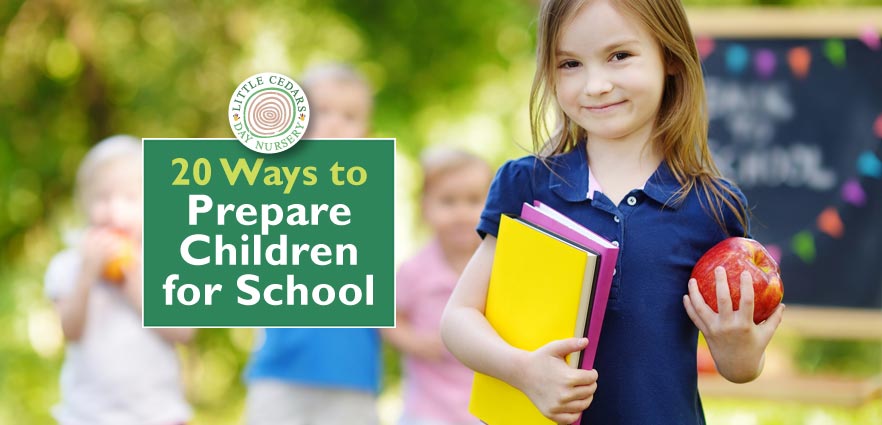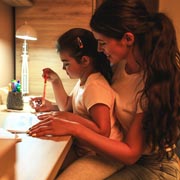
If you have a baby, toddler or preschooler, you’ll soon need to think about them starting school. The rules around starting school in England can be confusing at times, so today we take a look through commonly asked questions around the topic to clarify matters. For instance, at what age do children in England legally have to begin school? Is ‘Reception Year’ the same as Year 1 (no, by the way), and is attending Reception Class even compulsory? All these questions and many more are answered in today’s post. Click any question to reveal the answer.
Q: What is Reception Year?
Reception Year is the year most children in England, aged from 4 to 5, start school. It’s a kind of ‘in-between’ year, coming after nursery/pre-school, but before primary school ‘Year 1’. Although Reception Year takes place at primary school, it’s the final year of the Early Years Foundation Stage (EYFS) and continues to use a primarily play-based learning approach. However, once Reception Year is complete, children move to Year 1 and begin the Key Stage 1 (KS1) curriculum, a more adult-led, formal learning approach by topic.
Q: Are there other names for Reception Year?
Reception Year is also referred to simply as ‘Reception‘ as well as being known as Year R, Year 0, or FS2 (for Foundation Second Year).
Q: Is Reception Year the same as Year 1 at school?
No — as outlined above, Reception Year is the year that precedes Year 1 so, numerically speaking, is Year 0 (see the question above for additional naming variants).
Q: How important is Reception Year?
The general consensus is that children who attend school in Reception Year benefit hugely. Having attended Reception, reading, writing, numeracy, social skills and many other abilities will have improved. Studies show that longer-term academic outcomes, including GCSE grades, are improved. Even children’s likely earnings will be higher later on as adults — such is the positive effect of a good Reception Year education.
Q: Is Reception Year compulsory?
Attending school in Reception Year is not compulsory, but is a great way for children to transition from preschool to school and to gain extra teaching. As such, it is something that the UK Government’s Department of Education (DfE) believes children should not miss out on.
Q: What age are children who go into Reception Class?
Children who go into Reception Year are usually aged between 4 and 5. However, there are occasional exceptions. An example would be where a child aged 5 has missed Reception – for whatever reason – and their parents have later made a successful application for their admission to Reception “outside of the normal age group”.
Q: What age is it compulsory for my child to go to school?
The law states that children reach Compulsory School Age on the earliest of the 31st of the August, December, or March which arrives on or after they reach the age of 5. They would then usually start school in the September term that follows (being the start of the nearest full school year).
That said, most children begin school earlier, at the age of 4, as we’ll see below.
Q: Can my child start school at the age of 4?
Yes. Despite the compulsory school age for full-time education in England being five, most children actually start school at the age of four. The majority of them will start in ‘Reception Year’ in the September term that follows their fourth birthday. However, whilst still four, they can attend part-time, full-time, or even part of the way through the year. Indeed, some schools have a staggered system for 4-year-olds joining Reception Year, starting them part-time at first. Others, however, require full-time schooling right from the start.
Q: Can I defer my child‘s school start date until they’re 5?
Yes*, for what are known as ‘Summer born’ children. That’s if your child’s birthday falls somewhere during the period 1 April and 31 August and, for example, you feel they are not ready for the challenges of school while they’re still 4. In such a scenario, you can defer their start until they’re five — in accordance with Compulsory School Age rules outlined earlier. Learn more about delaying your child’s school start here.
* Different rules apply to children who are subject to an Educational, Health & Care (EHC) plan.
Q: What school year does my child join if they don’t start school until five?
If your child doesn’t start school until they’re five, local authorities and schools will decide whether such children should start in Reception Year (a year later than most of their peers of the same age) or go straight into Year One with children of the same age. It all comes down to what they feel would be in the child’s best interests, taking into account any special circumstances or special needs. Parents can, however, make a request for such children to start school in Reception Year as opposed to Year 1 and this is known as ‘requesting admission out of the normal age group‘.
This is a tricky area because, on the one hand, the Government’s official view is: “… it is usually not in a child’s best interests to miss the teaching that takes place during the Reception Year, and … it should be rare for a child to start school in year 1.” However, on the other hand, the usual ‘default’ for children starting school at the age of 5, whose parents have not made a request for admission out of the normal age group, is that they would usually go straight into Year 1 — i.e. with children their own age.
Q: When should I apply for a primary school place for my child?
Irrespective of whether your child begins school at the age of 4 or 5, you need to apply for a place when they are still 3, or at the very latest when they have just reached the age of 4. More details about applying for school places are available in this guide.
Q: How do I find a state-funded school for my child?
If you live in England*, your local authority is responsible for education in state-funded schools. Click here to find the right local authority for your area and then navigate to the relevant schools section of their website. This will contain a whole host of information usually including a school search function, term dates, eligibility requirements, how to apply for a school place, plus a wealth of additional school- and education-related information.
Try to visit any contenders — most will have open days. Also, check Ofsted reports and school performance tables and try to speak with parents whose children have attended to gain some insights.
* Scotland, Wales and Northern Ireland have different processes. (∞).
Q: How do I find a private/independent school place for my child?
You can alternatively pay for your child’s education through a private (‘independent’) school by making enquiries directly with them. Research to find them online, try a search engine or ask around for recommendations.
Like state-funded schools, independent schools are also inspected and reports will be available through whichever organisation inspects them (about half of them are through Ofsted).
Q: Can I ‘home-school’ my child instead of sending them to school?
In many cases you can, if you so decide, teach your child at home instead of sending them to school. This is known as homeschooling or ‘Elective Home Education’ (EHE). If going this route, your child must be receiving a suitable, efficient, full-time education and be doing so from the age of five. You can home-school them full-time or educate them part-time at home and the other part at school, although some schools may not allow part-time school placements.
However, there are some scenarios where it’s not possible to home-school your child. Examples may include some children who are party to a ‘School Attendance Order‘, some children with SEN attending special schools, and children who have been deemed by the local authority not to be receiving suitable home education.
Q: How do special educational needs or disabilities (SEND) affect Reception Year places?
By law, schools must publish certain information on their official websites and this includes a special educational needs (SEN) information report. This must explain their individual policies in regard to eligibility and arrangements for children who have special educational needs and disabilities.
If you would like to suggest any additional questions on the topics of starting school and Reception Year, please let us know using the middle button below; many thanks.
Little Cedars is a High-Quality Nursery in Streatham
Little Cedars Day Nursery provides first-class weekday childcare services in Streatham

 Little Cedars is a wonderful childcare nursery located in Streatham in London’s SW16 area. As you can see via the logo on the left, we are rated by Ofsted as a ‘Good Provider’, so you know your baby, toddler or preschooler will be in safe and caring hands. We’ll ensure they receive the very best care and an early years education that will help them become the very best version of themselves. In this way, they’ll be school-ready by the time they leave us to begin in Reception Year at primary school.
Little Cedars is a wonderful childcare nursery located in Streatham in London’s SW16 area. As you can see via the logo on the left, we are rated by Ofsted as a ‘Good Provider’, so you know your baby, toddler or preschooler will be in safe and caring hands. We’ll ensure they receive the very best care and an early years education that will help them become the very best version of themselves. In this way, they’ll be school-ready by the time they leave us to begin in Reception Year at primary school.
To further explore the chance of a childcare place for your child at Little Cedars Nursery, please get in touch using an option below:


 In a follow-up to last month’s post about
In a follow-up to last month’s post about 
 Reading with children, well ahead of them beginning school, has also been shown to boost their language skills, incredibly by the equivalent of as much as 8 months before they’re even five! The key is to read with them; not just to them. Learn more about
Reading with children, well ahead of them beginning school, has also been shown to boost their language skills, incredibly by the equivalent of as much as 8 months before they’re even five! The key is to read with them; not just to them. Learn more about  Listen to any reservations your child may have about the prospect of starting school. Listening is important, so be on the look-out for any concerns and reservations they may have.
Listen to any reservations your child may have about the prospect of starting school. Listening is important, so be on the look-out for any concerns and reservations they may have. Children will greatly benefit in Reception Year at school if they’re already independent when they start. So, nurturing aspects of their independence well ahead of them beginning school is a good policy. For example, ensuring they know how to independently look after personal hygiene, dress themselves, tie shoe laces, dress, use the toilet, pack their bag and so on. If they can do this before they start school, it will help them enormously.
Children will greatly benefit in Reception Year at school if they’re already independent when they start. So, nurturing aspects of their independence well ahead of them beginning school is a good policy. For example, ensuring they know how to independently look after personal hygiene, dress themselves, tie shoe laces, dress, use the toilet, pack their bag and so on. If they can do this before they start school, it will help them enormously. Parents/guardians will also be wise to identify one or more of their children’s friends (or potential friends) that will also be starting school at the same time. Ensure they meet up and play regularly, before they’ve started school. In this way, there will be a friendly face at the school from the moment they start. It’ll help them feel more at home and less alone.
Parents/guardians will also be wise to identify one or more of their children’s friends (or potential friends) that will also be starting school at the same time. Ensure they meet up and play regularly, before they’ve started school. In this way, there will be a friendly face at the school from the moment they start. It’ll help them feel more at home and less alone. Several weeks before they start school, children should start to synchronise their day with the timings of the new school day. This should include getting up time in the morning and ideally even timings for lunch and suchlike. In this way, children’s body clocks will have adjusted in good time, before they actually start.
Several weeks before they start school, children should start to synchronise their day with the timings of the new school day. This should include getting up time in the morning and ideally even timings for lunch and suchlike. In this way, children’s body clocks will have adjusted in good time, before they actually start. Ensuring children have everything they need, at least a little ahead of starting in Reception, is a good approach. Check that you have all items of their uniform, PE kit, any stationery, lunch box if appropriate, backpack or bag and so on. Is everything marked with your child’s name? Usually it should be.
Ensuring children have everything they need, at least a little ahead of starting in Reception, is a good approach. Check that you have all items of their uniform, PE kit, any stationery, lunch box if appropriate, backpack or bag and so on. Is everything marked with your child’s name? Usually it should be. Your child will need to know, ahead of time, who is collecting them. If it’s not you, then they need to know clearly who it will be. They also need to be clear around their general safety rules, stranger danger and so on. Schools should also have safeguarding policies in place for unexpected scenarios. For example, if you are unexpectedly delayed and need to send someone else to collect your child, does the school have a password system in place to ensure that only the right person can collect your child? Find out.
Your child will need to know, ahead of time, who is collecting them. If it’s not you, then they need to know clearly who it will be. They also need to be clear around their general safety rules, stranger danger and so on. Schools should also have safeguarding policies in place for unexpected scenarios. For example, if you are unexpectedly delayed and need to send someone else to collect your child, does the school have a password system in place to ensure that only the right person can collect your child? Find out.